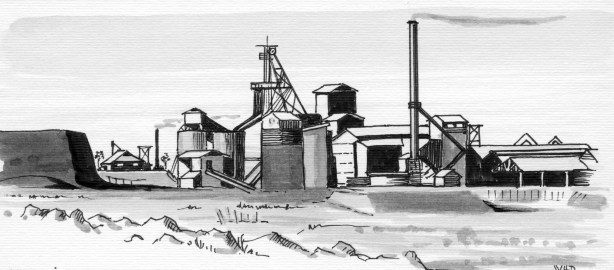Growing up in Kalgoorlie the name Croesus was very familiar to me. One of the mines situated halfway between Kalgoorlie and Boulder was called the Croesus mine. It was just across the road from my high school so all my high school years were spent breathing in sulphur fumes from Croesus. In between the school and the mine was a large area of public open space on which we played football and other sports, commonly known as the Croesus ground.
Common as the name was to me, I don’t think I ever investigated where it came from. From 560BC to 546BC the King of Sardis in what is now western Turkey, was King Croesus. Much of what we know about Croesus has come down through legend but it’s understood that he developed a means of purifying gold, that he may have produced the first gold coins and in fact, currency as we know it, is said to have been developed first by King Croesus.
This the latest in a series of posts featuring the seven churches addressed in the first three chapters of the book of Revelation in the Bible. Today I’m looking at the letter to the church in Sardis. (See Introduction to this series)
Perhaps it was Sardis’ reputation as a wealthy city that prompted Jesus to say to this church, through the apostle John: “To the angel of the church in Sardis write: These are the words of him who holds the seven spirits of God and the seven stars. I know your deeds; you have a reputation of being alive, but you are dead.
But the funeral hadn’t started yet … The letter then goes on to say: Wake up! Strengthen what remains and is about to die, for I have found your deeds unfinished in the sight of my God. Remember, therefore, what you have received and heard; hold it fast, and repent. But if you do not wake up, I will come like a thief, and you will not know at what time I will come to you.
Sardis was built at the foot of Mt Tmolus, a steep spur that formed a citadel at one end of the city. Throughout the history of Sardis there were a number of occasions when the city was attacked. One occasion that became legendary was the time that Sardis under King Croesus fell to Cyrus King of Persia. Croesus sought advice from many people including the famous oracle of Delphi who announced that a great empire would fall.
Croesus believed that was evidence that his own Lydian Empire would put the Persians to flight. Sardis was well protected on all sides except Mt Tmolus which they believed served as a natural protection. But because it wasn’t being watched, the enemy were able to climb up the mountain and get into the city without being seen. Croesus’ own Lydian Empire fell on that occasion.
Two centuries later Antiochus III did exactly the same thing. Once again the city was complacent about the dangers of not guarding Mt Tmolus. Once again the city fell after soldiers sneaked into the city through the same route that Cyrus’ soldiers had discovered.
Then, within the lifetime of some of the people who were still in the church a great earthquake had destroyed the city. Pliny described the earthquake in 17AD as the greatest earthquake in human memory, and Sardis never really recovered though the emperor did much to rebuild the city and provide financial relief.
The way in which the city had been infiltrated by laziness on the part of the military on at least two occasions was recorded in history and became part of folklore. The city was still living with the effects of a major earthquake that came upon them unexpectedly, so when Jesus said: I will come like a thief, and you will not know at what time I will come to you, they knew exactly what he meant. They knew about the embarrassment of being caught out sleeping on the job. And they knew they needed to listen to Jesus’ warning. Wake up.
The principle still applies to the church in the 21st century. We need to be aware. We need to be alert. We need to be awake.
The last part of the letter says: Yet you have a few people in Sardis who have not soiled their clothes. They will walk with me, dressed in white, for they are worthy. The one who is victorious will, like them, be dressed in white. I will never blot out the name of that person from the book of life, but will acknowledge that name before my Father and his angels. Whoever has ears, let them hear what the Spirit says to the churches.
Later on in Revelation we have a picture drawn for us of an amazing event in heaven where there is a description of people wearing white robes and holding palm branches. These people are described as having washed their robes and made them white in the blood of the Lamb.
This reminds us of the words of the prophet Isaiah who said: “Come now, let us settle the matter,” says the Lord. “Though your sins are like scarlet, they shall be as white as snow; though they are red as crimson, they shall be like wool.
Jesus, described as the Lamb of God, gave his life for us that we may be made pure in his sight. It’s not of our own doing, or our own efforts at goodness. It’s about the grace of the Lord Jesus who gave everything for our salvation. And it’s about our willingness to put our faith in Jesus for every aspect of our life.
The message to the church in Sardis was a message to people who were hoping that everything would be OK, but they weren’t ready. They still had unfinished business with Jesus. We are invited to deal with any unfinished business we have with Jesus so that we may be awake and ready for Him.
See the beginning of this series of posts: Introduction, or go on to the next poist.





